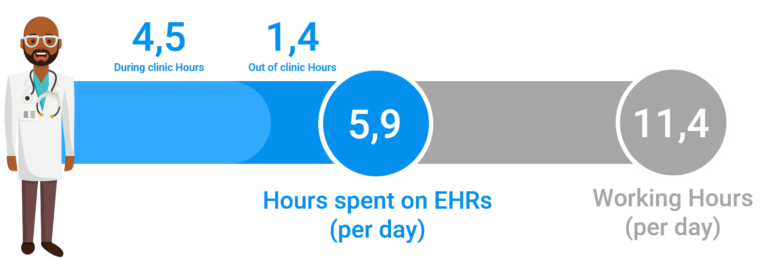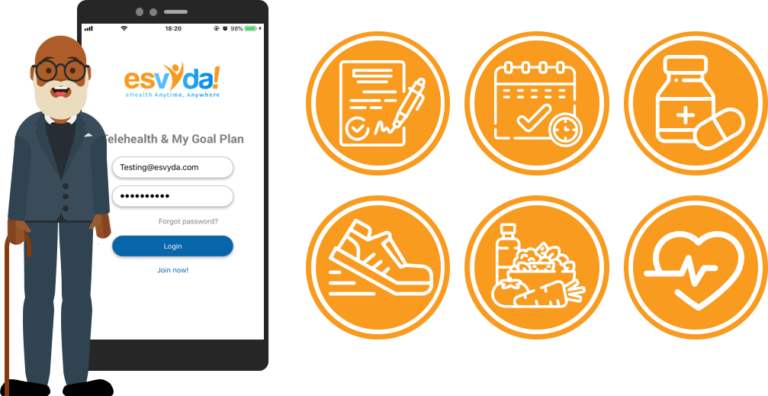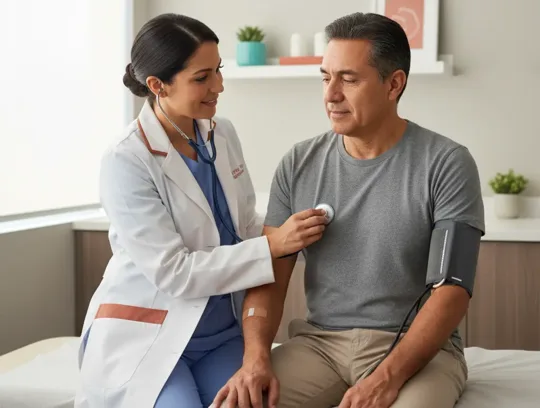Administrative burden and lack of care coordination in Healthcare are two of the most remarkable and time-consuming problems for health care providers. Let’s see how interoperability helps
Researchers at the University of Wisconsin and the American Medical Association performed a study at a large Academic Healthcare Center in Southern Wisconsin, with 142 family medicine physicians, released some key findings about time spent by physicians in administrative tasks. The study was conducted for three years. From here:

- From an 11.4-hour workday, a clinician spends 355 minutes (5.9 hours) in the EHR per equivalent to 269 minutes (4.5 hours) during clinic hours and 86 minutes (1.4 hours) after clinic hours, states the study.
- Clerical and administrative tasks including documentation, order entry, billing and coding, and system security accounted For nearly one-half of the total EHR time (157 minutes, 44.2 percent). Inbox management accounted for another 85 minutes (23.7 percent).
- Based on the study, two-thirds of the time on the computer was allocated to clerical and inbox work.
- In particular, it was found that much of a family medicine physician’s workday (84 minutes) is spent in documentation.
- For every hour a doctor spends with a patient, she spends two hours interfacing with an EMR.
- 56% of nurse time is spent away from the bedside documenting and coordinating care.
Then…Why Interoperability In Healthcare?
All the above findings are related to the lack of care coordination because of siloed systems and problems integrating medical data. Fragmented information of patients along the care journey cannot provide an overview about their problems. Healthcare is not well coordinated. Sometimes health care providers in the outpatient settings do not have information about the patient’s previous journey of care: Whether the patient came from home, Emergency Room, Hospital, Rehab. Center, or another facility.
Now patients want to be empowered by technologies that allow them to look for the best health care options online (affordability, convinience….), they do not want to travel long distances to wait forever in a room, they want to keep their healthcare information at their hands, they want to know how much they are charged for that care as well. (About appointments, payments…)
Interoperability helps health care providers to reduce administrative burden, coordinate care and to engage patients.
Patients may have the ability to do all the booking, check in and payment process using their phones and overall information may be sent directly to EHRs previous consultations, reducing time and paperwork for administrative staff, because clinicians and staff will have the information in real-time. Everything easily done: From consent forms electronically signed through payments done by patients, information available to all health care providers involved in the care of that patient.
Summary of consultations whether face to face or online may be easily exchanged with any authorized person involved in the care of patient and available to the patient in plain language and translated in tasks integrated to his daily routine such as medications, physical activity, and diet. The follow up of all activities may be monitored by healthcare providers in a timely manner, because the data is automatically uploaded to EHRs any time patient reports about his activities assigned using phones and communicating with the right people at the right time.

The coordination of care may be improved If any care team member is able to receive relevant information about the patient and follow up tasks performed by another team member or by patient himself, it means, exchanging communication at the time is needed.
Interoperability may allow to have the information about patients in one place, real-time follow up of their activities and interaction among care team members, reducing time, saving costs and providing better care to patients!
About Esvyda
Esvyda is a provider of virtual care solutions such as online consultations, telehealth and remote patient monitoring of vital signs and physical activities of patients, information that is seamlessly integrated in EHRs, providing actionable data to healthcare providers and their care teams and engaging patients.


